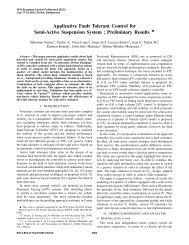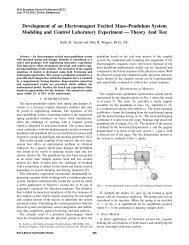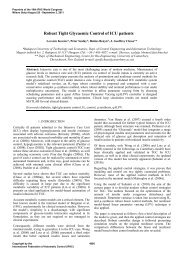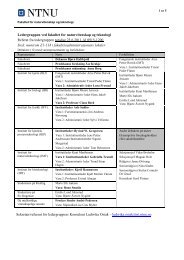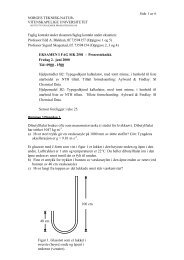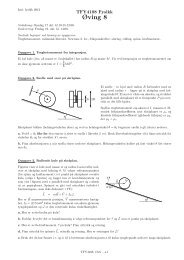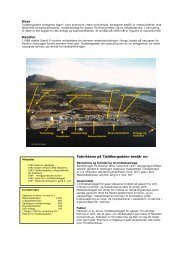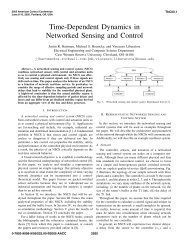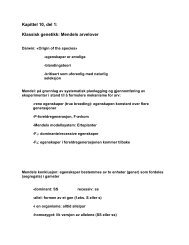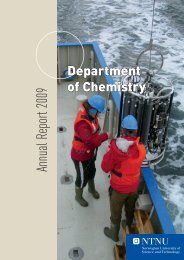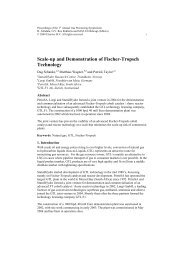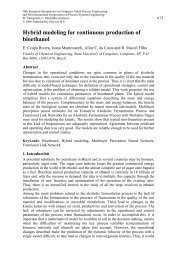- Page 1 and 2: AIChE Symposium Series No. 326 Volu
- Page 3 and 4: Preface The sixth International Che
- Page 5 and 6: Contents INVITED PAPERS Opening Ses
- Page 7: Feedback Control of Stable, Non-min
- Page 10 and 11: 2 Lowell B. Koppel Figure 2: Pareto
- Page 12 and 13: 4 Lowell B. Koppel Profit Profit Ef
- Page 16 and 17: 8 J. Patrick Kennedy and Osvaldo Ba
- Page 18 and 19: 10 J. Patrick Kennedy and Osvaldo B
- Page 20 and 21: Nonlinear Model Reduction for Optim
- Page 22 and 23: 14 Wolfgang Marquardt and the contr
- Page 24 and 25: 16 Wolfgang Marquardt puts and stat
- Page 26 and 27: 18 Wolfgang Marquardt (f) Implement
- Page 28 and 29: 20 Wolfgang Marquardt the introduct
- Page 30 and 31: 22 Wolfgang Marquardt A system is c
- Page 32 and 33: 24 Wolfgang Marquardt Formulation o
- Page 34 and 35: 26 Wolfgang Marquardt on nonlinear
- Page 36 and 37: 28 Wolfgang Marquardt earities. Bot
- Page 38 and 39: 30 Wolfgang Marquardt authors syste
- Page 40 and 41: 32 Wolfgang Marquardt a nonlinear m
- Page 42 and 43: 34 Wolfgang Marquardt trol problems
- Page 44 and 45: 36 Wolfgang Marquardt original mode
- Page 46 and 47: 38 Wolfgang Marquardt Amrhein, M.,
- Page 48 and 49: 40 Wolfgang Marquardt Kienle, A.,
- Page 50 and 51: 42 Wolfgang Marquardt Thibault, J.,
- Page 52 and 53: 44 Ton C. Backx development related
- Page 54 and 55: 46 Ton C. Backx input manipulations
- Page 56 and 57: 48 Ton C. Backx Operating Constrain
- Page 58 and 59: 50 Ton C. Backx tion (Verhaegen and
- Page 60 and 61: 52 Ton C. Backx DENS DENS DENS DENS
- Page 62 and 63: 54 Ton C. Backx Proceedings of Chem
- Page 64 and 65:
56 Sten Bay Jørgensen and Jay H. L
- Page 66 and 67:
58 Sten Bay Jørgensen and Jay H. L
- Page 68 and 69:
60 Sten Bay Jørgensen and Jay H. L
- Page 70 and 71:
62 Sten Bay Jørgensen and Jay H. L
- Page 72 and 73:
64 Sten Bay Jørgensen and Jay H. L
- Page 74 and 75:
66 Sten Bay Jørgensen and Jay H. L
- Page 76 and 77:
68 Sten Bay Jørgensen and Jay H. L
- Page 78 and 79:
70 Sten Bay Jørgensen and Jay H. L
- Page 80 and 81:
72 Sten Bay Jørgensen and Jay H. L
- Page 82 and 83:
74 Sten Bay Jørgensen and Jay H. L
- Page 84 and 85:
76 James S. Schwaber, Francis J. Do
- Page 86 and 87:
78 James S. Schwaber, Francis J. Do
- Page 88 and 89:
80 James S. Schwaber, Francis J. Do
- Page 90 and 91:
Computer-Aided Design of Metabolic
- Page 92 and 93:
84 Klaus Mauch, Stefan Buziol, Joac
- Page 94 and 95:
86 Klaus Mauch, Stefan Buziol, Joac
- Page 96 and 97:
88 Klaus Mauch, Stefan Buziol, Joac
- Page 98 and 99:
90 Klaus Mauch, Stefan Buziol, Joac
- Page 100 and 101:
Neuro-Dynamic Programming: An Overv
- Page 102 and 103:
94 Dimitri P. Bertsekas capture the
- Page 104 and 105:
96 Dimitri P. Bertsekas and other p
- Page 106 and 107:
98 Jan C. Willems models. Whence we
- Page 108 and 109:
100 Jan C. Willems Of particular in
- Page 110 and 111:
102 Jan C. Willems ever, there are
- Page 112 and 113:
104 Jan C. Willems these questions
- Page 114 and 115:
106 Jan C. Willems hinges damper do
- Page 116 and 117:
108 Jan C. Willems tems greatly enh
- Page 118 and 119:
110 Eduardo D. Sontag and u ∞ = (
- Page 120 and 121:
112 Eduardo D. Sontag ω3, I2u1 = (
- Page 122 and 123:
114 Eduardo D. Sontag Integral-Inpu
- Page 124 and 125:
116 Eduardo D. Sontag where the γi
- Page 126 and 127:
118 Eduardo D. Sontag was instrumen
- Page 128 and 129:
120 Eduardo D. Sontag stability,”
- Page 130 and 131:
122 Stefan Kowalewski refers to mod
- Page 132 and 133:
124 Stefan Kowalewski is empty fill
- Page 134 and 135:
126 Stefan Kowalewski y y 100 90 80
- Page 136 and 137:
128 Stefan Kowalewski of its own wh
- Page 138 and 139:
130 Stefan Kowalewski niques from o
- Page 140 and 141:
132 Stefan Kowalewski correctness o
- Page 142 and 143:
134 Stefan Kowalewski algorithmic a
- Page 144 and 145:
Hybrid System Analysis and Control
- Page 146 and 147:
138 Manfred Morari Relation Logic (
- Page 148 and 149:
140 Manfred Morari optima, but only
- Page 150 and 151:
142 Manfred Morari Figure 4: Reacha
- Page 152 and 153:
144 Manfred Morari Logic state Heat
- Page 154 and 155:
146 Manfred Morari x 2 #3 #4 5 4 3
- Page 156 and 157:
148 Manfred Morari Appendix HYSDEL
- Page 158 and 159:
Discrete Optimization Methods and t
- Page 160 and 161:
152 Ignacio E. Grossmann, Susara A.
- Page 162 and 163:
154 Ignacio E. Grossmann, Susara A.
- Page 164 and 165:
156 Ignacio E. Grossmann, Susara A.
- Page 166 and 167:
158 Ignacio E. Grossmann, Susara A.
- Page 168 and 169:
160 Ignacio E. Grossmann, Susara A.
- Page 170 and 171:
162 Ignacio E. Grossmann, Susara A.
- Page 172 and 173:
164 Ignacio E. Grossmann, Susara A.
- Page 174 and 175:
166 Ignacio E. Grossmann, Susara A.
- Page 176 and 177:
168 Ignacio E. Grossmann, Susara A.
- Page 178 and 179:
170 Lane Desborough and Randy Mille
- Page 180 and 181:
172 Lane Desborough and Randy Mille
- Page 182 and 183:
174 Lane Desborough and Randy Mille
- Page 184 and 185:
176 Lane Desborough and Randy Mille
- Page 186 and 187:
178 Lane Desborough and Randy Mille
- Page 188 and 189:
180 Lane Desborough and Randy Mille
- Page 190 and 191:
182 Lane Desborough and Randy Mille
- Page 192 and 193:
184 Lane Desborough and Randy Mille
- Page 194 and 195:
186 Lane Desborough and Randy Mille
- Page 196 and 197:
188 Lane Desborough and Randy Mille
- Page 198 and 199:
Multivariate Controller Performance
- Page 200 and 201:
192 Sirish L. Shah, Rohit Patwardha
- Page 202 and 203:
194 Sirish L. Shah, Rohit Patwardha
- Page 204 and 205:
196 Sirish L. Shah, Rohit Patwardha
- Page 206 and 207:
198 Sirish L. Shah, Rohit Patwardha
- Page 208 and 209:
200 Sirish L. Shah, Rohit Patwardha
- Page 210 and 211:
202 Sirish L. Shah, Rohit Patwardha
- Page 212 and 213:
204 Sirish L. Shah, Rohit Patwardha
- Page 214 and 215:
206 Sirish L. Shah, Rohit Patwardha
- Page 216 and 217:
Recent Developments in Controller P
- Page 218 and 219:
210 Thomas J. Harris and Christophe
- Page 220 and 221:
212 Thomas J. Harris and Christophe
- Page 222 and 223:
214 Thomas J. Harris and Christophe
- Page 224 and 225:
216 Thomas J. Harris and Christophe
- Page 226 and 227:
218 Thomas J. Harris and Christophe
- Page 228 and 229:
220 Thomas J. Harris and Christophe
- Page 230 and 231:
222 Thomas J. Harris and Christophe
- Page 232 and 233:
224 Efstratios N. Pistikopoulos and
- Page 234 and 235:
226 Efstratios N. Pistikopoulos and
- Page 236 and 237:
228 Efstratios N. Pistikopoulos and
- Page 238 and 239:
230 Efstratios N. Pistikopoulos and
- Page 240 and 241:
232 Efstratios N. Pistikopoulos and
- Page 242 and 243:
234 Efstratios N. Pistikopoulos and
- Page 244 and 245:
236 Efstratios N. Pistikopoulos and
- Page 246 and 247:
238 Efstratios N. Pistikopoulos and
- Page 248 and 249:
240 Karsten-U. Klatt, Guido Dünneb
- Page 250 and 251:
242 Karsten-U. Klatt, Guido Dünneb
- Page 252 and 253:
244 Karsten-U. Klatt, Guido Dünneb
- Page 254 and 255:
246 Karsten-U. Klatt, Guido Dünneb
- Page 256 and 257:
248 Karsten-U. Klatt, Guido Dünneb
- Page 258 and 259:
250 Karsten-U. Klatt, Guido Dünneb
- Page 260 and 261:
252 Karsten-U. Klatt, Guido Dünneb
- Page 262 and 263:
254 Karsten-U. Klatt, Guido Dünneb
- Page 264 and 265:
256 D. Bonvin, B. Srinivasan and D.
- Page 266 and 267:
258 D. Bonvin, B. Srinivasan and D.
- Page 268 and 269:
260 D. Bonvin, B. Srinivasan and D.
- Page 270 and 271:
262 D. Bonvin, B. Srinivasan and D.
- Page 272 and 273:
264 D. Bonvin, B. Srinivasan and D.
- Page 274 and 275:
266 D. Bonvin, B. Srinivasan and D.
- Page 276 and 277:
268 D. Bonvin, B. Srinivasan and D.
- Page 278 and 279:
270 D. Bonvin, B. Srinivasan and D.
- Page 280 and 281:
272 D. Bonvin, B. Srinivasan and D.
- Page 282 and 283:
Dynamics and Control of Cell Popula
- Page 284 and 285:
276 Prodromos Daoutidis and Michael
- Page 286 and 287:
278 Prodromos Daoutidis and Michael
- Page 288 and 289:
280 Prodromos Daoutidis and Michael
- Page 290 and 291:
282 Prodromos Daoutidis and Michael
- Page 292 and 293:
284 Prodromos Daoutidis and Michael
- Page 294 and 295:
286 Prodromos Daoutidis and Michael
- Page 296 and 297:
288 Prodromos Daoutidis and Michael
- Page 298 and 299:
Control of Product Quality in Polym
- Page 300 and 301:
292 Francis J. Doyle III, Masoud So
- Page 302 and 303:
294 Francis J. Doyle III, Masoud So
- Page 304 and 305:
296 Francis J. Doyle III, Masoud So
- Page 306 and 307:
298 Francis J. Doyle III, Masoud So
- Page 308 and 309:
300 Francis J. Doyle III, Masoud So
- Page 310 and 311:
302 Francis J. Doyle III, Masoud So
- Page 312 and 313:
304 Francis J. Doyle III, Masoud So
- Page 314 and 315:
306 Francis J. Doyle III, Masoud So
- Page 316 and 317:
308 Richard D. Braatz and Shinji Ha
- Page 318 and 319:
310 Richard D. Braatz and Shinji Ha
- Page 320 and 321:
312 Richard D. Braatz and Shinji Ha
- Page 322 and 323:
314 Richard D. Braatz and Shinji Ha
- Page 324 and 325:
316 Richard D. Braatz and Shinji Ha
- Page 326 and 327:
318 Richard D. Braatz and Shinji Ha
- Page 328 and 329:
320 Richard D. Braatz and Shinji Ha
- Page 330 and 331:
322 Richard D. Braatz and Shinji Ha
- Page 332 and 333:
324 Richard D. Braatz and Shinji Ha
- Page 334 and 335:
326 Richard D. Braatz and Shinji Ha
- Page 336 and 337:
Linking Control Strategy Design and
- Page 338 and 339:
330 James J. Downs effective tool.
- Page 340 and 341:
332 James J. Downs FC FY < DP Figur
- Page 342 and 343:
334 James J. Downs Heat Input Feed
- Page 344 and 345:
336 James J. Downs FC DP Figure 6:
- Page 346 and 347:
338 James J. Downs Furnace Furnace
- Page 348 and 349:
340 James J. Downs Water Refining s
- Page 350 and 351:
Evolution of an Industrial Nonlinea
- Page 352 and 353:
344 Robert E. Young, R. Donald Bart
- Page 354 and 355:
346 Robert E. Young, R. Donald Bart
- Page 356 and 357:
348 Robert E. Young, R. Donald Bart
- Page 358 and 359:
350 Robert E. Young, R. Donald Bart
- Page 360 and 361:
Emerging Technologies for Enterpris
- Page 362 and 363:
354 Rudolf Kulhav´y, Joseph Lu and
- Page 364 and 365:
356 Rudolf Kulhav´y, Joseph Lu and
- Page 366 and 367:
358 Rudolf Kulhav´y, Joseph Lu and
- Page 368 and 369:
360 Rudolf Kulhav´y, Joseph Lu and
- Page 370 and 371:
362 Rudolf Kulhav´y, Joseph Lu and
- Page 372 and 373:
A Definition for Plantwide Controll
- Page 374 and 375:
366 Surya Kiran Chodavarapu and Ale
- Page 376 and 377:
368 Surya Kiran Chodavarapu and Ale
- Page 378 and 379:
370 Nael H. El-Farra and Panagiotis
- Page 380 and 381:
372 Nael H. El-Farra and Panagiotis
- Page 382 and 383:
Rolf Findeisen ∗ and Frank Allgö
- Page 384 and 385:
376 Rolf Findeisen, Frank Allgöwer
- Page 386 and 387:
378 Rolf Findeisen, Frank Allgöwer
- Page 388 and 389:
380 Guruprasad A. Giridharan and Mi
- Page 390 and 391:
382 Guruprasad A. Giridharan and Mi
- Page 392 and 393:
Assessment of Performance for Singl
- Page 394 and 395:
386 Hsiao-Ping Huang and Jyh-Cheng
- Page 396 and 397:
388 Hsiao-Ping Huang and Jyh-Cheng
- Page 398 and 399:
390 Joshua M. Kanter, Warren D. Sei
- Page 400 and 401:
392 Joshua M. Kanter, Warren D. Sei
- Page 402 and 403:
394 Truls Larsson, Sigurd Skogestad
- Page 404 and 405:
396 Truls Larsson, Sigurd Skogestad
- Page 406 and 407:
Robust Passivity Analysis and Desig
- Page 408 and 409:
400 Huaizhong Li, Peter L. Lee and
- Page 410 and 411:
402 Huaizhong Li, Peter L. Lee and
- Page 412 and 413:
404 Tore Lid, Stig Strand and Sigur
- Page 414 and 415:
406 Tore Lid, Stig Strand and Sigur
- Page 416 and 417:
Analysis of a Class of Statistical
- Page 418 and 419:
410 Kenneth R. Muske and Conner S.
- Page 420 and 421:
412 Kenneth R. Muske and Conner S.
- Page 422 and 423:
414 Michael Nikolaou and Mohan R. C
- Page 424 and 425:
416 Michael Nikolaou and Mohan R. C
- Page 426 and 427:
Abstract Efficient Nonlinear Model
- Page 428 and 429:
420 Robert S. Parker The weighting
- Page 430 and 431:
422 Robert S. Parker distillation),
- Page 432 and 433:
424 Stéphane Renou, Michel Perrier
- Page 434 and 435:
426 Stéphane Renou, Michel Perrier
- Page 436 and 437:
Steady State Multiplicity and Stabi
- Page 438 and 439:
430 Iván E. Rodríguez, Alex Zheng
- Page 440 and 441:
432 Iván E. Rodríguez, Alex Zheng
- Page 442 and 443:
434 Matthew J. Tenny, James B. Rawl
- Page 444 and 445:
436 Matthew J. Tenny, James B. Rawl
- Page 446 and 447:
Industrial Experience with State-Sp
- Page 448 and 449:
440 Ernest F. Vogel and James J. Do
- Page 450 and 451:
442 Ernest F. Vogel and James J. Do
- Page 452 and 453:
444 Zhaoyang Wan and Mayuresh V. Ko
- Page 454 and 455:
446 Zhaoyang Wan and Mayuresh V. Ko
- Page 456 and 457:
Time Series Reconstruction from Qua
- Page 458 and 459:
450 M. Wang, S. Saleem and N. F. Th
- Page 460 and 461:
452 M. Wang, S. Saleem and N. F. Th
- Page 462 and 463:
454 Author Index Schmid, Joachim, 8
- Page 464:
456 Subject Index Mixed-integer dyn



